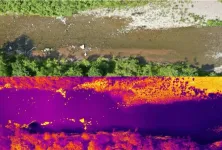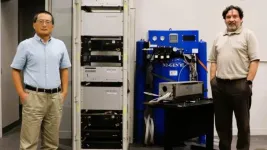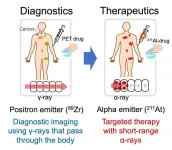(Press-News.org) Most people think of dementia as something that affects a person’s brain. But a new study shows just how much damage it does to a person’s wallet and bank account too – as well as the higher demands it places on their family members.
In all, people diagnosed with dementia saw their out-of-pocket spending for health care more than double, and their net worth decline by more than 60%, within the first eight years of being diagnosed, the study finds.
Meanwhile, other people of similar ages and in similar health, but without dementia, didn’t see much change in either financial measure in that time, according to the findings published in JAMA Internal Medicine by a team from the University of Michigan.
The study also reveals major differences in demand on family members. By the end of their second year after the onset of symptoms, people with dementia needed three times more hours of care from family and friends than their peers without dementia did.
People with dementia also entered nursing homes at nearly five times the rate of their peers in those first two years. Those who had less family support available were much more likely to enter a nursing home.
People with dementia were also much more likely than their peers to use paid in-home care, which is often not fully covered by Medicare.
Another sign of financial distress: enrollment in Medicaid, the safety-net health care program for people living in poverty, nearly doubled for people with dementia in the first eight years after diagnosis. The rate of enrollment stayed flat for their peers.
How the study was done
The new analysis uses data from the Health and Retirement Study, a long-term in-depth study based on interviews and health exams – to reveal trends that previous studies using Medicare data alone could not.
The researchers analyzed data from nearly 2,400 adults who had the onset of dementia, and an equal number of older adults who were carefully matched based on extensive socioeconomic characteristics, health and healthcare status.
They looked at data for both groups from before the dementia onset, all the way to eight years after the diagnosis. HRS is based at U-M’s Institute for Social Research.
Striking differences
“The differences between these two groups, both in terms of use of care and financial impacts, were even larger than we had expected,” said HwaJung Choi, Ph.D., the study’s lead author and a health economist and research associate professor in the U-M Medical School’s Department of Internal Medicine.
“What we found regarding unpaid caregiving from family and others is the most striking and persistent care use difference, with 45 hours per month on average for people with dementia, compared with 13 hours for those without, by the end of two years,” added Choi, who is also a faculty associate at ISR. “The difference remains sustained at that level across eight years.”
Providing much needed support for family caregivers is being addressed by two programs taking effect in 2024 from the Centers for Medicare and Medicaid Services: one that will allow clinics to get paid to provide caregiver education, and a pilot program specifically focused on improving support and care coordination for caregivers of people with dementia.
Choi and her colleagues, including U-M School of Public Health researcher Cathleen Connell, Ph.D., used an approach called propensity score matching to carefully match each person with dementia with a person whose health and other factors were very similar to theirs. Dementia onset was based on a validated measure using an array of data from the Health and Retirement Study.
This matching process allowed the researchers to see just how substantial the additional financial and health care burden of dementia really is for an individual.
With 6.7 million Americans currently diagnosed with dementia, and an increasing number expected to receive that diagnosis in coming years, Choi says it’s critical to get a realistic picture of these impacts to inform policy decisions at the state and national level, but also for individuals and families to plan.
She notes that the high rate of hours of care provided by family members for people with dementia persisted across the eight years, even as paid home-based care and hospital stays decreased as more individuals were admitted to nursing homes. Choi notes that staff shortages in nursing homes exacerbate the demand on family caregivers.
Finances diverge
At baseline, the time before their dementia diagnosis, study participants’ wealth averaged $79,000 when all assets and debts were counted. Overall, the wealth of the peer group without dementia was about the same.
Both groups had annual out-of-pocket spending for medical expenses such as co-pays, deductibles, over-the-counter purchases and home care of about $4,000 at baseline.
By the end of two years, people with dementia saw their average wealth drop to $58,000, and their out-of-pocket costs double to around $8,000. Their peers saw neither of these impacts.
By the end of eight years, people with dementia had spent twice as much as their peers out of their own pockets for health expenses and had seen their wealth drop to an average of $30,500 while their peers saw no significant drop.
“What we’re really seeing here is two very different situations over a relatively short time for very similar families, determined just by a single diagnosis,” said Connell. “It’s a really striking comparison and may be driven largely by the ‘spend down’ of assets by many families in order to qualify for Medicaid coverage of long-term care in a nursing home.”
Keeping people with dementia living in their home or a non-nursing home setting such as assisted living is a key goal of major policy proposals – but means that Medicare, rather than Medicaid, would pay more of the cost.
Family support differences
The availability of family support was a critical factor in moving to nursing home residence, both at baseline and by the end of eight years after dementia onset.
Nearly one in three people with dementia who had no spouse or child at baseline were living in nursing homes by their eighth year after dementia onset.
The rate was nearly as high – about 1 in 4 -- among those who had a spouse with a disability and a child who lived nearby, and those who had no spouse but had a child who lived nearby.
By comparison, nursing home residence was half as common among those who either lived with a non-disabled spouse when they were first diagnosed, or who had both a spouse and a child living with them, whether or not their spouse had a disability.
Choi plans to continue her work on family dynamics related to dementia, including examining the impact of COVID-era changes in health care and nursing home visitation, as well as the role of family members beyond spouses and adult children, such as grandchildren, siblings and stepchildren.
Choi, Connell and study co-authors Kenneth Langa, M.D., Ph.D., Edward Norton, Ph.D., are members of the U-M Institute for Healthcare Policy and Innovation. U-M SPH doctoral student Tsai-Chin Cho, M.S., B.S. is also a co-author.
The study was funded by the National Institute on Aging (AG057820, AG01284626, AG009740).
Reference:
Changes in Care Use and Financial Status Associated With Dementia in Older Adults, JAMA Internal Medicine, doi:10.1001/jamainternmed.2023.5482
END
Dementia’s financial & family impact: New study shows outsize toll
Compared with peers, people with dementia face a rapid rise in unpaid and paid home care, and major erosion of net worth plus increases in personal spending
2023-10-16
ELSE PRESS RELEASES FROM THIS DATE:
Early behavioral health problems need earlier interventions
2023-10-16
CINCINNATI--A six-year study that analyzed data from a 25-question screening tool found alarming evidence of unhealthy behavioral trajectories starting as early as age 2 among families affected by low income and other social stressors.
Findings from the study led by Robert Ammerman, PhD, and colleagues at Cincinnati Children’s were published Oct. 16, 2023, in JAMA Pediatrics. (DOI: 10.1001/jamapediatrics.2023.4229)
Experts may not be surprised by another study reporting an association between family stress and child behavioral problems. However, the early ages of onset and severity of behavioral problems were unexpected. Importantly, ...
Salmon cooling stations
2023-10-16
16 October 2023
The Geological Society of America
Release No. 23-36
Contact: Justin Samuel
+1-303-357-1026
jsamuel@geosociety.org
For Immediate Release
Pittsburgh, Pa., USA: You’ve heard of the salmon run: upon reaching sexual maturity, wild Atlantic salmon, which are born in freshwater rivers but spend most of their adult life in the ocean, swim upstream all the way back to their birthplace to spawn. This remarkable migration—a journey thousands of miles long, against the current—is filled with obstacles, from dams to hop over to hungry bears to dodge.
Climate warming has brought about an additional hurdle for wild Atlantic salmon populations: rising water ...
Measuring the changing soundscape in Glacier National Park
2023-10-16
16 October 2023
The Geological Society of America
Release No. 23-38
Contact: Justin Samuel
+1-303-357-1026
jsamuel@geosociety.org
For Immediate Release
Pittsburgh, Pa., USA: From the eerie echo of a bugling elk to the gentle swoosh of water lapping against a stony shore, a unique combination of sounds helps distinguish each national park. This acoustic environment, as perceived by humans, is known as a soundscape, and it is a vital attribute—albeit one that is increasingly under threat from anthropogenic noise.
Whether from the hum ...
A clean-energy future for legacy coal?
2023-10-16
Lehigh University researchers Carlos Romero, Director of the Energy Research Center (ERC), co-Associate Director of the Institute for Cyber Physical Infrastructure and Energy (I-CPIE), and a faculty member in the Department of Mechanical Engineering and Mechanics, and Zheng Yao, Principal Research Scientist at the ERC, have been awarded a DOE STTR (Department of Energy Small Business Technology Transfer) award for Phase II of their proposal, “Machine Learning Enhanced LIBS to Measure and Process Biofuels ...
New study assesses safety and efficacy of radial access for peripheral artery interventions
2023-10-16
WASHINGTON (October 16, 2023) – A new study published today in the Journal of the Society for Cardiovascular Angiography & Interventions (JSCAI) explores the safety and efficacy of using radial access (RA) for peripheral artery interventions. The study, conducted by a team of researchers from prominent medical centers, aimed at examining evaluating the safety and feasibility of RA for complex endovascular lower extremity interventions.
Peripheral artery interventions, such as angioplasty and stenting, are commonly performed to treat vascular conditions ...
New research points out ways to improve tuberculosis vaccines
2023-10-16
A new study from the University of Pittsburgh Center for Vaccine Research published today in the Journal of Experimental Medicine describes a previously unappreciated role for a class of immune cells in the early stages of tuberculosis (TB) infection.
The researchers found that innate CD8+ lymphocytes – a subtype of white blood cells involved in rapid immune response – are essential for curbing the disease. They also discovered that an inflammatory molecule called Interleukin-15, or IL-15, plays an important role in infection control and could potentially be used to boost ...
Regenstrief and SNOMED International broaden collaboration to facilitate interoperability nationally and globally by linking LOINC and SNOMED CT
2023-10-16
INDIANAPOLIS, US and LONDON, UK -- With the goal of facilitating broader interoperability of health data around the globe to enhance and improve the delivery of healthcare, LOINC® from Regenstrief and SNOMED International have commenced generation of The LOINC Ontology: A LOINC and SNOMED CT interoperability solution.
The LOINC Ontology supports providers and users who implement different combinations of SNOMED CT and LOINC in health information systems and allows them to meet clinical and regulatory requirements ...
St. Jude Children’s Research Hospital, ALSAC announce new board leaders
2023-10-16
St. Jude Children’s Research Hospital® and ALSAC, its fundraising and awareness organization, announced new leaders of the St. Jude Board of Governors and ALSAC Board of Directors today. The announcement comes at a time when St. Jude is advancing the largest strategic investment in its 61-year history, designed to profoundly impact children around the world who face cancer and other life-threatening diseases.
Those elected to lead the Boards include:
St. Jude Chair Judy A. Habib is an experienced business leader and brand strategist with roots in healthcare and lab sciences. Having ...
SwRI’s new aerospace acoustic testing system can simulate the deafening noise of a rocket launch
2023-10-16
SAN ANTONIO — October 16, 2023 —Southwest Research Institute’s aerospace acoustic test chamber can now simulate the complex and harsh acoustic environment associated with the thunderous noise of a rocket launch to ensure that space systems can endure blastoff conditions. The test chamber is the newest addition to SwRI’s 74,000-square-foot Space System Spacecraft and Payload Processing Facility, created to rapidly respond to customers needing to design, assemble and test spacecraft, ...
A powerful new tool in the fight against one of the deadliest cancers
2023-10-16
Osaka, Japan – Pancreatic ductal adenocarcinoma (PDAC) is one of the deadliest cancers worldwide, with a 5-year survival rate of less than 10%. Many PDAC tumors in early stage go undetected because they are not found using conventional imaging methods, including fluorodeoxyglucose positron emission tomography (PET) scans. To more efficiently combat this pancreatic cancer, a team led by researchers at Osaka University is combining diagnostic and therapeutic procedures into a single integrated process: ‘theranostics’.
In an article recently published in Journal of Nuclear Medicine, the team has developed a ‘radio-theranostics’ strategy that uses a new ...
LAST 30 PRESS RELEASES:
Children with poor oral health more often develop cardiovascular disease as adults
GLP-1 drugs associated with reduced need for emergency care for migraine
New knowledge on heritability paves the way for better treatment of people with chronic inflammatory bowel disease
Under the Lens: Microbiologists Nicola Holden and Gil Domingue weigh in on the raw milk debate
Science reveals why you can’t resist a snack – even when you’re full
Kidney cancer study finds belzutifan plus pembrolizumab post-surgery helps patients at high risk for relapse stay cancer-free longer
Alkali cation effects in electrochemical carbon dioxide reduction
Test platforms for charging wireless cars now fit on a bench
$3 million NIH grant funds national study of Medicare Advantage’s benefit expansion into social supports
Amplified Sciences achieves CAP accreditation for cutting-edge diagnostic lab
Fred Hutch announces 12 recipients of the annual Harold M. Weintraub Graduate Student Award
Native forest litter helps rebuild soil life in post-mining landscapes
Mountain soils in arid regions may emit more greenhouse gas as climate shifts, new study finds
Pairing biochar with other soil amendments could unlock stronger gains in soil health
Why do we get a skip in our step when we’re happy? Thank dopamine
UC Irvine scientists uncover cellular mechanism behind muscle repair
Platform to map living brain noninvasively takes next big step
Stress-testing the Cascadia Subduction Zone reveals variability that could impact how earthquakes spread
We may be underestimating the true carbon cost of northern wildfires
Blood test predicts which bladder cancer patients may safely skip surgery
Kennesaw State's Vijay Anand honored as National Academy of Inventors Senior Member
Recovery from whaling reveals the role of age in Humpback reproduction
Can the canny tick help prevent disease like MS and cancer?
Newcomer children show lower rates of emergency department use for non‑urgent conditions, study finds
Cognitive and neuropsychiatric function in former American football players
From trash to climate tech: rubber gloves find new life as carbon capturers materials
A step towards needed treatments for hantaviruses in new molecular map
Boys are more motivated, while girls are more compassionate?
Study identifies opposing roles for IL6 and IL6R in long-term mortality
AI accurately spots medical disorder from privacy-conscious hand images
[Press-News.org] Dementia’s financial & family impact: New study shows outsize tollCompared with peers, people with dementia face a rapid rise in unpaid and paid home care, and major erosion of net worth plus increases in personal spending






